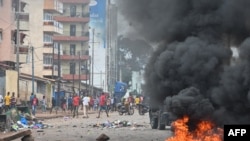Guinea’s military-appointed government this week announced the dissolution of the main opposition group, the National Front for the Defense of the Constitution, or FNDC.
The decree Monday cited alleged violence and threats to national unity and peace. Critics and rights groups said the move threatened Guinea’s return to democratic rule.
The decision to dissolve the FNDC came just hours after it had called for nationwide peaceful demonstrations to demand dialogue among the military, opposing parties and civil society groups.
A report by Human Rights Watch called the government’s allegations vague and said the FNDC was not given the opportunity to defend itself before an independent judicial body.
Dissolution of the FNDC comes 11 months after it led demonstrations against then-President Alpha Conde, who was ultimately ousted in a military coup last September.
Democratic values 'jeapordized'
Ilaria Allegrozzi, a senior Africa researcher with Human Rights Watch, said the coup was already a major blow to democracy and human rights in Guinea.
"And this recent decision to dissolve the main opposition coalition is yet another indication that democratic values in Guinea are being jeopardized," Allegrozzi said. "Human rights defenders, political activists and political opponents are at risk.”
The FNDC was composed of civil society groups and opposition parties that accused Guinea’s transitional government of authoritarian behavior.
Guinea is one of several West African countries that have experienced coups over the last two years. The unrest has been driven by the growth of a jihadist insurgency and an increase in unconstitutional third-term bids.
Allegrozzi said Guinea’s actions send a negative message to other countries in the region that are struggling to transition to democracy.
“Regional political volatility is becoming entrenched in West Africa and Central Africa, and that should be countered,” Allegrozzi said.
Allegrozzi called on the African Union and the West African economic bloc ECOWAS to increase pressure on Guinea to reestablish democratic rule.
In 2010, Conde became Guinea's first democratically elected president, but accusations of corruption and authoritarian behavior mounted throughout his time in office. Last September, after winning what critics said was an illegal third term, he was overthrown.
Pledge of civilian rule again
Guinea's interim president, Colonel Mamady Doumbouya, a former special forces commander, pledged to return the country to civilian rule within three years. However, ECOWAS and the FNDC argue three years is far too long.
Amadou Barry, a Guinean Canadian professor of philosophy specializing in international relations at the Cegep de Saint-Hyacinthe in Quebec, Canada, told VOA from Conakry that since Conde’s ouster, Guineans have clung to the hope that they would see peace. Instead, they have witnessed the same conflict repeating itself.
"This hope is falling down," he said, "because now we are seeing that we are not able to organize society around democratic principles and the rule of law. It is important to ask, ‘Why aren’t we able to have a political regime that is democratic?’ ”
Barry said constructive dialogue around the issue of collective power is the only way forward.




